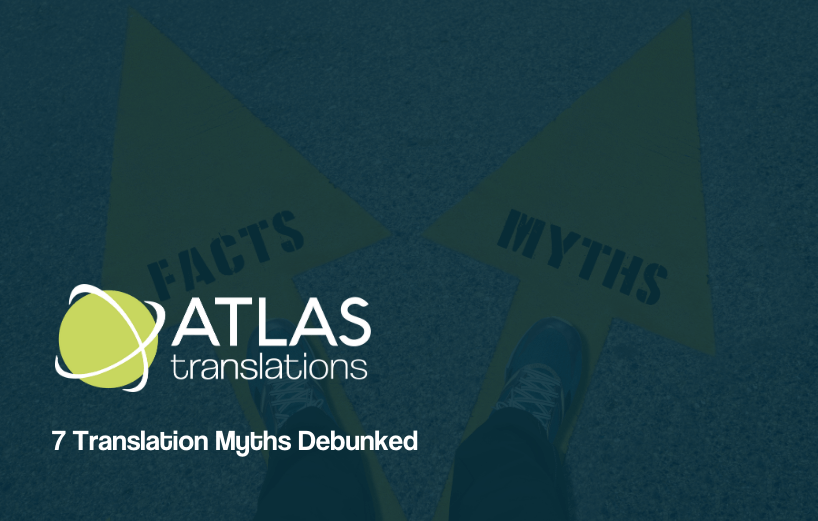7 Translation Myths Debunked

We are often surprised at the amount of misconceptions and wrong ideas that people have about the translation industry and translation in general. Let’s have a look at some of the most common assumptions being made about this line of work and debunk some translation myths.
Myth: Bilingual people can translate between their languages in any direction.
Truth: Being bilingual is not enough to become a translator. It takes time and dedication to master the necessary skills required to translate accurately. The vast majority of translators only work in one direction: from the source language into their mother tongue. There are very few translators who can easily translate both ways. Even in the case of bilingual people, they will, undoubtedly, feel more comfortable with one of the two languages and will usually translate exclusively into that language.
Myth: Interpreters and translators do the same thing.
Truth: Even though there are similarities between the two professions, and some people are able to do both, they are nevertheless very different. Firstly, translators deal with the written word, while interpreting is about the spoken word – two very different things. A translator and an interpreter require different sets of skills and tools of the trade.
Similarities:
- Both translators and interpreters are bound to keep the information they have access to while doing an assignment confidential
- They are not allowed to change or delete/omit anything from the original document/speech
Differences:
- Whilst translators working with written text often face high-pressure situations when it comes to tight deadlines, we are especially in awe of face-to-face interpreters. Having to think clearly and quickly is a vital skill for interpreters who work face-to-face with clients. While translators will usually have time to consider their choices, more often than not interpreters are required to produce instantaneous yet accurate translations, which can be challenging
- Translators have the advantage of being able to do their research while working on an assignment. They have access to dictionaries, so if there is a word they do not know or can’t remember immediately, all they have to do is look it up. An interpreter does not have that privilege
- Interpreters may have assignments that can be emotionally challenging (custody cases, patients with terminal illnesses), but also fun and pleasant ones (they may even be asked to dress up to interpret at a formal dinner party for example)
- While translators can check their work or have it checked by a proofreader after they have finished and make changes, for an interpreter the situation is quite different: once the words are out there, you cannot magically get them back
Myth: Machine translations will replace human translations.
Truth: Absolutely not, or at least not in the near future. However clever this invention is, it is still automated, which means it will never be able to grasp the subtleties of a language, let alone idioms. What they do provide is a word-for-word translation, which will help you get the gist of what the texts says but will not produce a natural-sounding and high-quality translation. When dealing with specialised texts of high importance, it’s always best to invest in professional human translation services.
Myth: There is no need for translation, everyone understands English.
Truth: Surprising as it may seem, about 75% of the world population do not speak English (either as their first or second language). That is too big a market to be ignored. Studies have shown that around 73% of consumers are more likely to buy from a website if it is in their native language. But it is not only about businesses. Legal contracts, letters, statements and other types of documents need to be translated if the parties involved do not speak the same language.
Myth: A translator can translate anything – from poetry to legal contracts.
Truth: Would you expect a heart surgeon to operate on your brain? Well, just as doctors are highly specialised in their chosen field, so are translators. Some will focus on legal translation or may have financial expertise, whereas others will prefer literary translations. Beware of any translator who claims they can translate anything!
Myth: Back translation is the best way to check the accuracy of a translation.
Truth: Well, yes and no – it all depends on the type of text. Let’s look at two examples:
– A literary text – in this case, the original document and the back translated one will never be exactly the same. A translation is not a mere word-for-word rendition of the original document. It will convey meaning, style and tone, making sure that the result will not read as a translation, but as a new text that reads naturally in the new language. Translation is not an exact science, it borders art
– However, when the document to be translated is of a scientific nature, such as medical records, prescriptions etc., back translations are imperative. Pharmaceutical companies will often have everything back translated to make sure it has been properly translated, with nothing added or omitted
Myth: Translation is overpriced, so I’ll choose the cheapest supplier.
Truth: Pricing is a tricky matter. Quality comes at a price. You cannot expect the highest quality from anyone who charges a flat rate of 4p per word for any language combination, regardless of subject matter. They will most likely outsource it to an under-qualified “translator” who will run it through automated translation software, or they will do that themselves. The costs for you may seem low at first, but in the long run this can affect your business’ reputation, and once that is lost, it is very difficult to rebuild.
Here at Atlas translations, we are passionate about spreading information about translation and language services. If you’re looking for high-quality and professional translation or interpreting services, we’ll be happy to hear from you.














